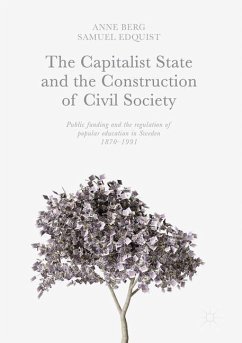This book challenges the idea that a sharp boundary should be drawn between the state and civil society. Although this idea is extremely common in modern capitalist societies, here it is turned on its head through a study of the ways in which public funding from the 1870s to the 1990s has enabled and shaped collective action in Swedish popular education. Popular education has generally been seen as independent of government control, with strong connections to popular and labour movements; in this volume, Berg and Edquist narrate a new story of its rise by analysing how a government grant system was constructed to drive its development. A key element in this government policy was to create and protect popular education as an autonomous phenomenon, yet making it perform state functions by regulating its bureaucratic make-up and ideological content. The book will appeal to scholars and students of history, education, and sociology, particularly those with an interest in the workingsof the capitalist state as well as the history of education.
Bitte wählen Sie Ihr Anliegen aus.
Rechnungen
Retourenschein anfordern
Bestellstatus
Storno








